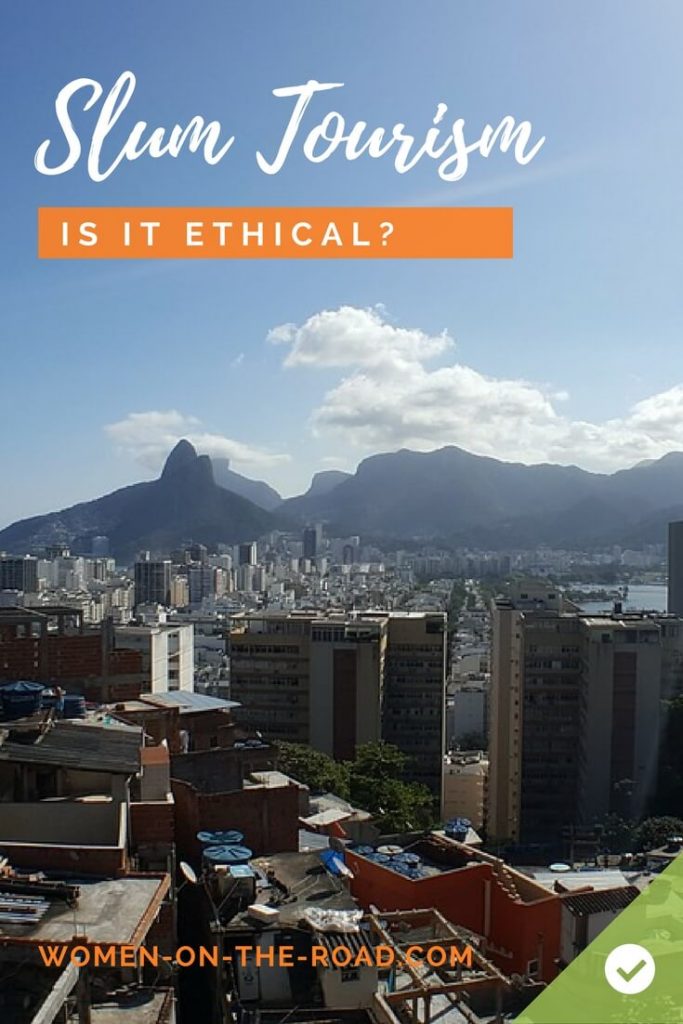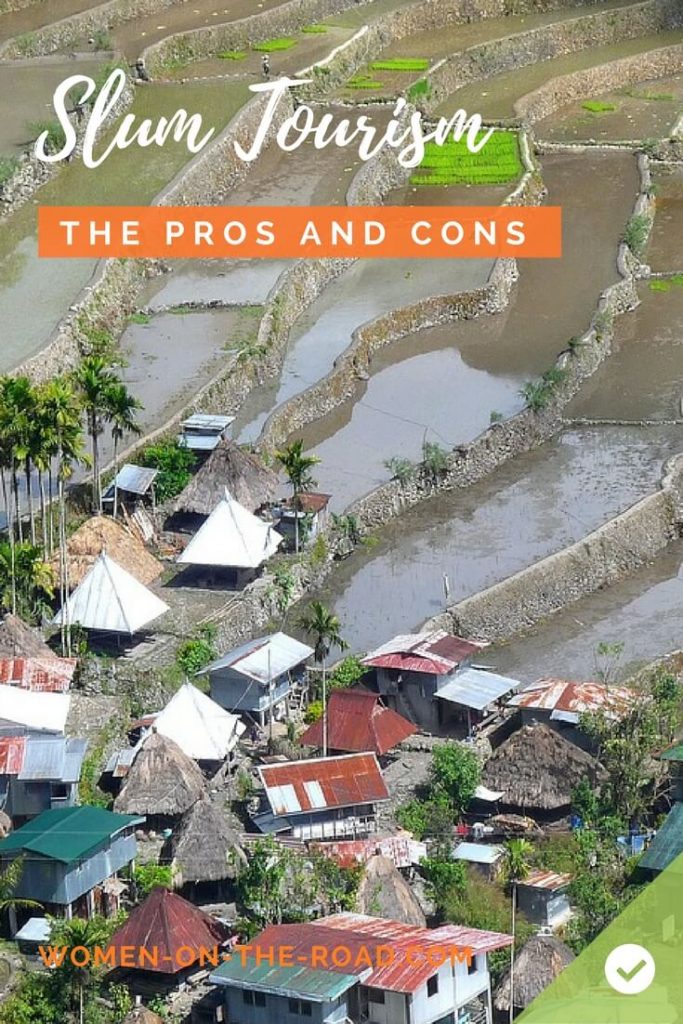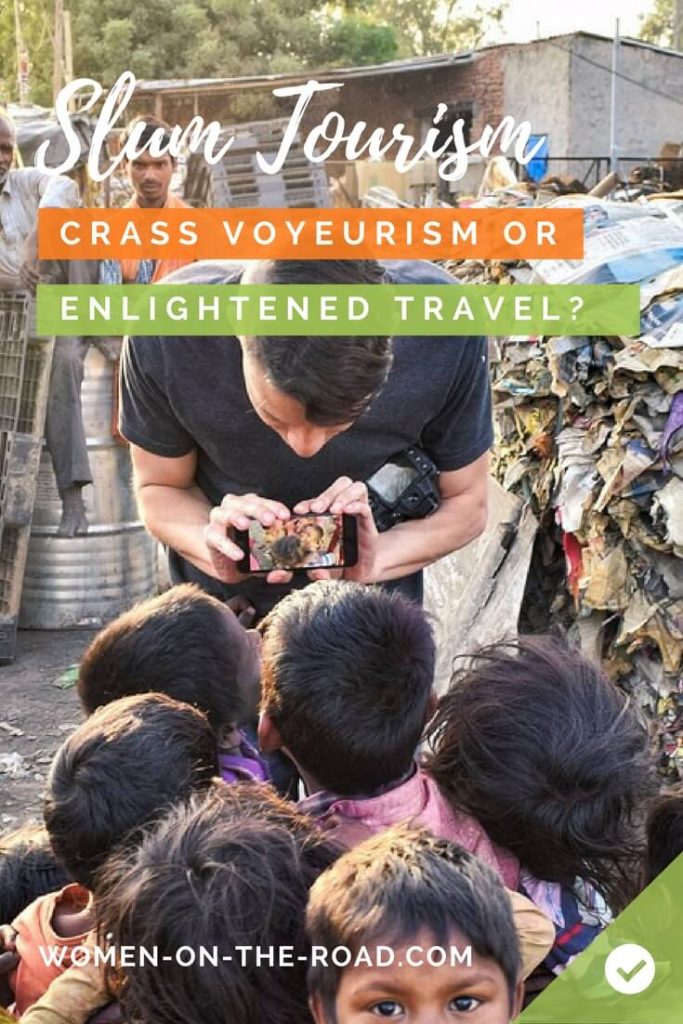Let me begin by saying I have engaged in slum tourism (a basic definition of slum tourism would be the kind of tourism that takes you to see impoverished communities).
I took an African slum Soweto tour during a long-ago visit to South Africa, to see a place that overflowed with meaning. In 1976, during the Soweto Uprising in which unarmed students were stormed and killed by police for refusing to study in Afrikaans, I was a university student in Political Science, engulfed (at a distance) in liberation movements and revolutions. Soweto was part of that, as well as a major chapter in the bigger South African story of apartheid and discrimination.
It was a place I wanted to see, but the then boycott of South Africa was in full swing and I would have to wait nearly two decades.

Years later as a journalist, I was escorted through some of the most crowded favelas in Rio by a young community nurse who worked with drug addicts and knew everyone. He was respected and we were stopped on every corner for a bit of a chat.
The afternoon I spent in Rocinha gave me a slightly better understanding of the poverty that fuels much of the addiction and crime, something I certainly would not have learned from the back of a bus.
It also showed me a side that surprised me – the regular everyday life of people less fortunate than myself. The streets were dirty and the housing rickety but people came and went, shopped, talked, laughed – and went to work, determined to make things better.
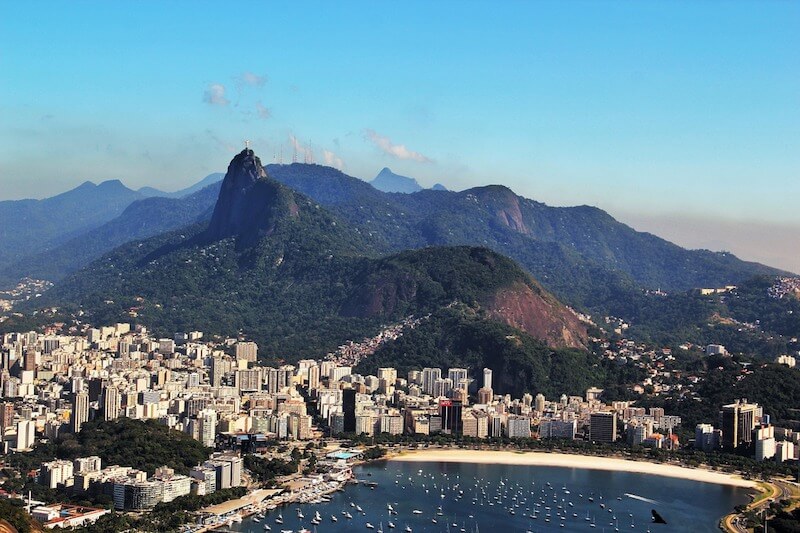
Oddly enough, at least to me, not everyone was poor. Walking around highlighted differing characteristics of slums. Some dwellings were decidedly middle-class, because here as everywhere else, when people succeed they don’t necessarily want to leave their friends and family.
Over the years, visits to poorer urban and slum areas have left me unsettled. Children sniffing glue under a bridge in Brasilia. Mothers scavenging on the world’s biggest scrap heap in Manila. Begging for food near a Nairobi slum. Homeless children in Malawi.
These are scenes that drive home the accident of humanity, of where I happened to be born, of my race and privilege, and how easily it might have been otherwise.
On the one hand, it showed me what is life like in a slum, but on the other, it left me unsure of whether I was engaging in ethical tourism.
So was slum tourism positive or detrimental, and does it hurt or help a slum economy? it still begs to question; “Is slum tourism good or bad?”
WHAT IS A SLUM? AND WHAT IS SLUM TOURISM?
SLUM DEFINITION
• noun: 1 – a squalid and overcrowded urban area inhabited by very poor people. 2 – a house or building unfit for human habitation.
• verb: (slummed, slumming) (often slum it) informal voluntarily spend time in uncomfortable conditions or at a lower social level than one’s own.
Source: Compact Oxford English dictionary
Slum tourism has been around since Victorian times, when wealthy Londoners trudged down to the East End for a view. The end of apartheid in South Africa fueled a more politically-oriented type of ‘township tour’ while Rocinha has been receiving tourists for years – some 50,000 a year now.
In India, the release of the movie Slumdog Millionnaire created space for even more slums of India tours. In Nairobi, enterprising Kenyans are guiding tourists on Kibera slum tours, one of the better-known urban slums (and one of the world’s bigger slum areas) with a population of one million inhabitants.
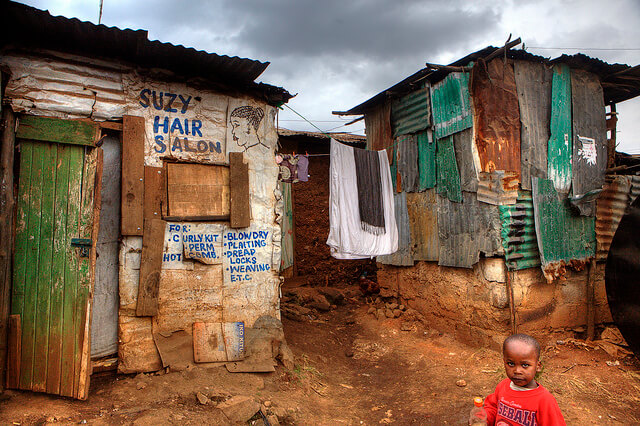
The voyeur aspect of slum tourism makes me intensely uneasy.
Imagine a busload of foreign visitors traipsing down your street, peering into your house, taking a selfie in front of your door… Yet that’s exactly what happens on some township tourism slum tours, often labeled poverty tourism, pity tours, ghetto tourism, reality tours or even poorism – there is no dearth of labels.
So is slum tourism ethically acceptable or is it exploitative? What are the advantages and disadvantages of slum tourism? Do our tourist dollars actually help these communities or are we simply paying for a peek into lives we have no intention of ever experiencing for more than a few minutes? What are the impacts of slum development?
SLUM TOURISM PROS AND CONS
Negatives of slum tourism: exploitation and voyeurism
Why slum tourism is bad (or can be):organized slum visits have come under harsh criticism, particularly as they become more popular.
Much of the criticism revolves around these slum tourism cons:
- Slum tours treat people like animals in a zoo – you stare from the outside but don’t dare get too close.
- Visitors aren’t interested in meaningful interaction; they just want their photo op. Contact with locals is minimal.
- Money rarely trickles down. Instead, operators fill their pockets but the vaunted ‘benefits to the community’ don’t materialize. Slum tourism profits from poverty, which is why it is often called “poverty tourism”.
- People feel degraded by being stared at doing mundane things – washing, cleaning up, preparing food, things that are private. Their rights to privacy may be violated. Imagine yourself at the receiving end: how would you feel?
- Even when they participate as hosts, local people are often underpaid and exploited.
- The image of a country may be tarnished by publicizing slums (this is an actual concern among certain segments of certain populations – usually the more wealthy).
- The tours make poverty exotic, otherworldly, almost glamorizing what to inhabitants is a harsh reality which will remain once the tourists are long gone, which is one of the main slum tourism disadvantages.
How true is this picture?
UN-HABITAT defines a slum household as a group of individuals living under the same roof in an urban area who lack one or more of the following:
1. Durable housing of a permanent nature that protects against extreme climate conditions.
2. Sufficient living space which means not more than three people sharing the same room.
3. Easy access to safe water in sufficient amounts at an affordable price.
4. Access to adequate sanitation in the form of a private or public toilet shared by a reasonable number of people.
5. Security of tenure that prevents forced evictions.
Slum tourism benefits: improving local lives
So are there slum tourism advantages? There may be a flip side. Slum tourism has supporters, many of whom believe tourism will ultimately benefit the favela or the township and help improve the lives of people who live there.
Visitors who take these tours may genuinely care and are interested in knowing more about the people they meet and the places they see.
Here are some of the potential benefits of slum tourism:
- Even if it’s only a little, some money does enter the community, whether through meals at home or the purchase of art or souvenirs. Many say this tourism boosts the local economy. This trickle-down economy is bound to be better for local residents than picking trash off a stinking garbage heap.
- The tours change our perceptions of poverty by putting a face to it and showing visitors that however poor, people are the same everywhere and share similar thoughts and emotions.
- Tourists will visit areas they would never go to otherwise.
- Some operators have made sure part of their profits are recycled into local hands, for example by starting local charities.
- A spotlight on poor areas by foreigners may help governments move more quickly to improve conditions by using tourism as an economic developement tool.
- Even in the poorest areas development and innovation can take place: slum tours can showcase the economic and cultural energies of a neighborhood.
- They can improve our understanding of poverty and of one another – and of the world at large.
- Local people may support them. Locally-run slum tourism examples include Zezinho da Rocinha’s own favela tour (a slum-dweller himself, see below what he has to say on the effects of tourism in his community).
- They can bring us closer and demystify and debunk some of our stereotypes. This excellent video (below) by one of my favorite authors, Chimamanda Ngozi Adichie, highlights the dangers of what she calls a ‘single story’, or what happens when a single point of view is hammered home, in this case, the ‘single story’ of poverty and pity.
THE SLUM TOURISM DEBATE: SO, IS IT A GOOD THING OR A BAD THING?
There is no such thing as a star system for slum tours, an ethical rating that will tell you how well an operator is performing or what the real economic benefits of tourism in the community really are. So, it’s up to us to find out before booking.
Here are some of the things we should look for:
- Size matters. A huge tour rumbling through a neighborhood in an air-conditioned bus is probably not going to promote much interchange with local residents. Ask how many people will be on your tour.
- Look at the highlights and figure how long you’ll be in each place. If you’re expected to eat in a home, visit a local shebeen and walk through several streets in the space of an hour, chances are you won’t be getting to know your hosts in any significant way. Visitors need and have asked for more time for real exchanges with local people, as real as such unequal exchanges can be. Make sure you have enough time to interact.
- Explore how the tour was designed. Who put it together? Who came up with the itinerary? Why are you visiting one place and not another? Ask the organizers if local people were involved, and double-check once you’re in the community.
- Follow the money. Find out where the profits go and if the tourism economics are more beneficial than harmful. Are some profits returned to the community? What has been achieved – are there more schools, projects, education or jobs as a result? Ask the operators, and double check their answers.
Granted, much of this information will not be easy to find, especially before you book.
But you have the ethical obligation to find out: what are the disadvantages of slum tourism in the area you are visiting? But by asking the right questions, you are showing you care, and are forcing tour operators to tackle these issues.
Once you’re on the tour, you’ll have a better sense of its ethics and if you don’t like what you see, there’s always social media. If a tour is exploitative – well, word gets around fast.
There are many signs slum tourism is changing the future of tourism.
More charities are being set up to spread profits around, local people are becoming increasingly involved, negative stereotypes are being challenged, local artisans are being encouraged to sell their work to tourists at fair prices, and tour operators themselves are beginning to understand that slum tourism is not like mass tourism: they don’t have to cram every possible attraction into the shortest possible time.
While some feel much good can come from properly thought-out slum tours, others believe slum tourism has done more harm than good, with insensitive itineraries pulled together purely for gain.
So which is it: Would visitors be better off staying in a luxury downtown hotel while pretending not to see the slum next door? Or is knowledge and awareness the first step towards understanding?
For more information on slum tourism, these resources may help:
- Slum Dwellers International is a is a network of community-based organizations of the urban poor in 33 countries in Africa, Asia, and Latin America.
- Slumtourism.net brings together academics and practitioners working on tourism in slums and poor rural areas.
- The world’s five largest slums.
Both For And Against Slum Tourism
By Zezinho Da Rocinha, Proud Favela Resident In Rio De Janeiro
I certainly understand the controversy about slum tours. I am both FOR and AGAINST them. Let me explain this.
I was born, grew up and still live in Brazil’s largest slum, or favela. Life is dificult yes, but not impossible. I am proud to live here in Rocinha. I will never leave here, I do not want to leave here. This is my home. This is my feeling about this issue of slum/favela tourism.
What I like about the tours is the contact I get from foreigns who come here. This interaction helps me to educate people about my life here in the favela. When foreigners come here I feel like my home or favela has value and is worth to be seen. The Brazilian government mostly ignores us and helps us very little. We want our voice to be heard. I want to feel that somebody on the outside cares about us and recognizes that we exist. Up until about a few years ago favelas did not exist on maps. Why was this?
Many foreigners come to learn how we create and live in our comunity with little or no goverment involvement. Others come because of the art and culture that exist here.
I do not judge why people come, they confirm that we exist.
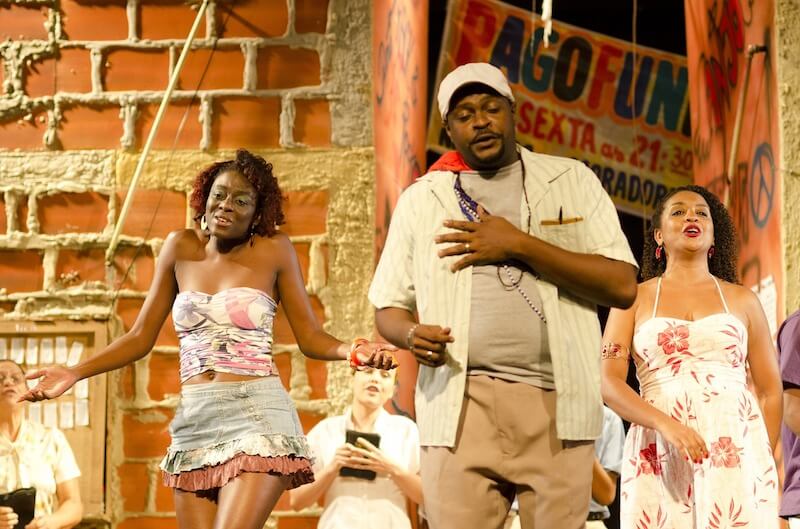
I started in tourism because I saw the opportunity to show my favela and help create jobs for others here.
We live here, and should be making the tours here. I have heard outsider tour companies exaggerate things or tell outright lies about my favela. They do this because they do not know and do not live here. I am here to share a social experience, not provide some adrenalin tour.
With my work, many visitors return to volunteer with social projects or to start their own programs in the favela. Recently people have contacted me wanting to make projects like a rooftop garden class. Another person wants to help bring solar energy here. These are people who came on visits here in the favela. Is this bad?
What I do NOT like about the tours…tours that use jeeps or trucks are the worst because they present us like a zoo. The tourists have no contact with the locals and this reinforces a sense of possible danger. Tours or visits where the guests walk in the favela are more welcome. There is one company that tells their guests not to interact with the locals if they are approached. This is wrong.
The glamorization of violence is another thing that we do not like here. It is as if these companies are trying to capitalize on some kind of excitement. Favelas are not war zones, and people need understand that real, honest hardworking people live there, we just make less money.
There are tour companies here who use the community to make money but they give very little or nothing back to the community. This is not right. They should contribute something for the betterment of the favela. There are plenty of social projects here that could use help.
I am not ashamed to live in the favela and people should not feel shame to come and visit. All we ask is please do not take photos of us like we are animals, and do not have fear if we say hello to you on the street.
If we want to stop or reduce poverty, we need to stop pretending it does not exist. I call it socially responsible tourism. If you chose to tour this type of community, try to give something back, however big or small. I work with an art school and encourage people to bring art supplies, not money.
Slums, favelas and shanties are where 1/3 of the population live in all major cities, serving the needs of mostly the rich. Visiting these places may increase your knowledge and awareness at a much deeper level than visiting a museum or art exhibition. Ignoring poverty is not going to make it go away and those who have more, should not feel guilt. Unfortunately, this world will always have this unbalance of wealth. Sad but true.
Read more about Zezinho on his blog, Life in Rocinha or book a favela walking tour.
— Originally published on 06 February 2011
PIN THESE PICTURES AND SAVE FOR LATER!
